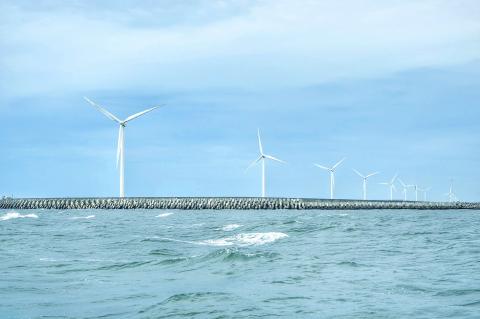The Executive Yuan has approved measures to liberalize the power market and break up state-run Taiwan Power Co (Taipower, 台電), as well as increase the number of public kindergartens by 1,000 by 2020 to expand childcare coverage and increase women’s participation in the workforce.
The Executive Yuan yesterday passed an amendment of the Electricity Act (電業法) that would deregulate the power market and promote “green” energy.
The proposal calls for Taipower to transform into a holding company with subsidiaries.

Photo courtesy of Taiwan Power Co
According to the draft amendments, “green” energy firms will be allowed to sell and transmit electricity to users directly, with pricing being freely negotiated between generating companies and clients, Bureau of Energy Director-General Lin Chuan-neng (林全能) said.
Currently, firms can only sell power to Taipower, Lin said.
Businesses will be permitted to operate traditional power plants, but they can only sell electricity to Taipower, he said.
To complete the separation of power generation and electricity distribution, Taipower has to be divided into subsidiary companies in six to nine years following the passage of the draft amendment by the Legislative Yuan, with a company responsible for power generation and another for distribution and retailing, Lin said.
The “public electricity retailing industry,” which is to be composed of Taipower spinoffs, would be obliged to supply power to the public, which will also have the choice to purchase “green” energy, he said, adding that “non-renewable” electricity rates would be regulated to offset price fluctuations due to global fuel costs.
The Executive Yuan was planning an across-the-board liberalization to deregulate both the traditional and renewable energy markets, but the latest amendment is mainly focused on the “green” energy sector, Executive Yuan spokesman Hsu Kuo-yung (徐國勇) said.
The traditional power sector would be liberalized in the next round of legislation to allow operators to freely enter electricity retailing, Hsu said.
“The government has adopted a gradual approach to liberalization to prevent the legislation from being stalled,” he said.
The legislation is necessary, as Taipower’s monopoly of the industry is what is prohibiting rapid growth in the renewable energy industry, Premier Lin Chuan (林全) said, adding that it is the government’s priority to liberate the “green” energy market during this legislative session.
“Criticism saying that the legislation would lead to higher electricity prices and the monopolization of the power market by business groups is incorrect,” Hsu quoted the premier as saying.
“The percentage of green energy in the nation’s power grid is too low and even if the price of green energy increases several times over [following the liberalization], it would not affect electricity supply,” Minister of Economic Affairs Lee Chih-kung (李世光) said.
Hydroelectric and nuclear power plants will continue to be state-run.
Meanwhile, the Executive Yuan is to budget NT$6.2 billion (US$196.6 million) to establish 1,000 kindergartens in the next four years.
Minister of Education Pan Wen-chung (潘文忠) said the plan is to boost the number of “non-profit kindergartens” — facilities run privately on refurbished public properties — and public kindergartens.
The plan is expected to raise the percentage of children enrolled in public or non-profit kindergartens from 30 percent to 40 percent by 2020, Pan said.
“The measure will provide affordable childcare to allow women to enter the workforce,” Pan said.

CHAOS: Iranians took to the streets playing celebratory music after reports of Khamenei’s death on Saturday, while mourners also gathered in Tehran yesterday Iranian Supreme Leader Ayatollah Ali Khamenei was killed in a major attack on Iran launched by Israel and the US, throwing the future of the Islamic republic into doubt and raising the risk of regional instability. Iranian state television and the state-run IRNA news agency announced the 86-year-old’s death early yesterday. US President Donald Trump said it gave Iranians their “greatest chance” to “take back” their country. The announcements came after a joint US and Israeli aerial bombardment that targeted Iranian military and governmental sites. Trump said the “heavy and pinpoint bombing” would continue through the week or as long

TRUST: The KMT said it respected the US’ timing and considerations, and hoped it would continue to honor its commitments to helping Taiwan bolster its defenses and deterrence US President Donald Trump is delaying a multibillion-dollar arms sale to Taiwan to ensure his visit to Beijing is successful, a New York Times report said. The weapons sales package has stalled in the US Department of State, the report said, citing US officials it did not identify. The White House has told agencies not to push forward ahead of Trump’s meeting with Chinese President Xi Jinping (習近平), it said. The two last month held a phone call to discuss trade and geopolitical flashpoints ahead of the summit. Xi raised the Taiwan issue and urged the US to handle arms sales to

State-run CPC Corp, Taiwan (CPC, 台灣中油) yesterday said that it had confirmed on Saturday night with its liquefied natural gas (LNG) and crude oil suppliers that shipments are proceeding as scheduled and that domestic supplies remain unaffected. The CPC yesterday announced the gasoline and diesel prices will rise by NT$0.2 and NT$0.4 per liter, respectively, starting Monday, citing Middle East tensions and blizzards in the eastern United States. CPC also iterated it has been reducing the proportion of crude oil imports from the Middle East and diversifying its supply sources in the past few years in response to geopolitical risks, expanding

Pro-democracy media tycoon Jimmy Lai’s (黎智英) fraud conviction and prison sentence were yesterday overturned by a Hong Kong court, in a surprise legal decision that comes soon after Lai was jailed for 20 years on a separate national security charge. Judges Jeremy Poon (潘兆初), Anthea Pang (彭寶琴) and Derek Pang (彭偉昌) said in the judgement that they allowed the appeal from Lai, and another defendant in the case, to proceed, as a lower court judge had “erred.” “The Court of Appeal gave them leave to appeal against their conviction, allowed their appeals, quashed the convictions and set aside the sentences,” the judges